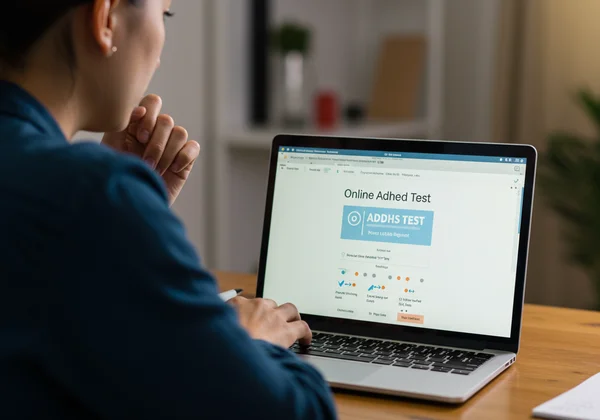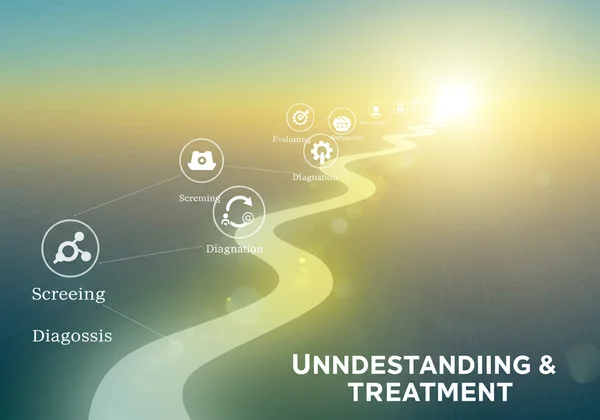What to Do After an Online ADHD Test: Talking to Your Doctor
Feeling a mix of relief and confusion after taking an online ADHD test? You're not alone. Seeing results that resonate with your life experiences can be validating, but it also raises a crucial question: What should I do after taking an online ADHD test? This guide empowers you to confidently discuss your potential ADHD symptoms and screening results with your doctor, guiding you from confusion to concrete next steps. The first step you've taken is significant, and now it's time to build on that foundation.
Taking a confidential screening can be an insightful first step. If you haven't yet, or wish to review your results, you can take our free online ADHD test to receive a personalized report.

Preparing for Your Doctor's Visit About Potential ADHD
Walking into a doctor's office to discuss ADHD can feel daunting. Proper preparation is key to making the conversation productive and ensuring your concerns are heard. By organizing your thoughts and materials beforehand, you can turn anxiety into effective self-advocacy. This preparation is a crucial part of the process to prepare for ADHD diagnosis.
Documenting Your ADHD Symptoms and Personal Observations
Your lived experience is your most valuable data. While an online screening provides a structured overview, personal anecdotes bring your challenges to life. Before your appointment, take time to reflect and write down specific examples of how potential ADHD symptoms have impacted you.
Think about different areas of your life:
- Work or School: Do you struggle with deadlines, organization, or focusing during meetings or lectures? Have you consistently received feedback about careless mistakes or unfinished projects?
- Home and Daily Life: Is your living space often chaotic? Do you have trouble with household chores, paying bills on time, or remembering appointments?
- Relationships: Do you find yourself interrupting others, zoning out during conversations, or experiencing emotional outbursts that affect your interactions with loved ones?
Create a concise list of these observations. The more specific you are, the clearer the picture you can paint for your healthcare provider. This detailed self-reflection is a valuable starting point for a productive discussion.

Why Your Online ADHD Test Results Matter
Bringing your results from an online ADHD test to your doctor is not about self-diagnosing; it's about providing a structured starting point for the conversation. Think of it as a helpful summary of your concerns, based on scientifically informed questions. It shows that you've put thought into your symptoms and are serious about seeking professional insight.
The personalized AI-driven report you receive from our platform is particularly useful. It often breaks down your responses into key areas related to inattention and hyperactivity/impulsivity. This can help you and your doctor pinpoint specific patterns that warrant further investigation. Presenting this report demonstrates initiative and provides a framework for your discussion.
Effectively Sharing Your Online ADHD Test Results
Once you're prepared, the next step is knowing how to present your findings effectively. The way you frame the conversation can significantly impact its outcome. The goal is to collaborate with your doctor, using your online screening results as a tool to kickstart a professional evaluation. This is the core of sharing online ADHD test information productively.
Framing the Conversation: Screening vs. Clinical Diagnosis
It is vital to understand and communicate the difference between a screening and a formal ADHD diagnosis test. An online tool is a screener—it identifies potential traits that may suggest the presence of ADHD. A clinical diagnosis, however, is a comprehensive evaluation conducted by a qualified healthcare professional, such as a psychiatrist, psychologist, or neurologist.
When you begin the conversation, frame it clearly. You could say something like: "I've been struggling with focus and organization for a while. I took a confidential online ADHD screening to better understand my experiences, and the results suggested I might have traits associated with ADHD. I'd like to discuss these concerns with you and explore the possibility of a formal evaluation."
This approach shows your doctor that you respect their professional expertise and are using the screening tool as intended—as a resource to open a dialogue.

Highlighting Key Insights from Your Personalized Report
Your AI personalized report is more than just a score. It’s a detailed analysis of your response patterns. When speaking with your doctor, don't just hand them the report; guide them through the key insights that resonated with you the most.
Point to specific sections of the report. For example, you might say, "The report highlighted significant challenges in the area of inattention, which aligns with my struggles to complete tasks at work." or "I noticed my score for impulsivity was high, and here are some real-life examples of that." By connecting the data from the report to your lived experiences, you create a powerful and compelling narrative. If you want to see what this report looks like, you can get your report confidentially and instantly.
Key Questions to Ask Your Doctor About ADHD
Your appointment is a two-way conversation. Asking thoughtful questions empowers you to understand the next steps and make informed decisions about your health. Having a list of questions ready is one of the most effective ADHD doctor visit tips. It shows you are an active participant in your healthcare journey.
Inquiring About the Formal ADHD Diagnostic Process
Understanding the road ahead can significantly reduce anxiety. Don't hesitate to ask your doctor for clarity on the evaluation process. This will help you know what to expect. Knowing how is ADHD tested in adults or children is a right you have as a patient.
Consider asking the following questions:
-
What does a formal ADHD evaluation consist of?
-
Will you be conducting the evaluation, or will I need a referral to a specialist?
-
What kind of information will I need to provide? (e.g., school records, family history)
-
How long does the diagnostic process typically take?

Discussing Treatment Options and Support Systems
While a diagnosis is still pending, it’s wise to look ahead. Understanding the potential support systems available can provide hope and direction. Discussing ADHD treatment options doesn't mean you are jumping to conclusions; it means you are preparing for all possible outcomes.
Useful questions include:
- If a diagnosis is confirmed, what are the typical treatment pathways you recommend?
- What are the non-medication options for managing ADHD symptoms, such as therapy, coaching, or lifestyle changes?
- Are there any local support groups or resources you would recommend?
Taking an online ADHD screening is the first step on a journey toward understanding yourself better.
Empowering Your Next Steps in Understanding ADHD
Navigating the path to understanding whether you or a loved one has ADHD is a journey of self-discovery. Starting with a reliable online screening tool gives you the structure and confidence to take the crucial next step: speaking with a healthcare professional. Remember, this is your journey, and you are your own best advocate. By preparing thoughtfully and communicating clearly, you can turn your questions into a plan for a brighter, more focused future.
Are you ready to gain clarity? Take the first step today. Start your test now to get your confidential, AI-powered insights in minutes.
Frequently Asked Questions About Discussing ADHD Test Results
Is an online ADHD test considered accurate by medical professionals?
Medical professionals view reputable online ADHD tests as valuable screening tools, not diagnostic instruments. Their accuracy lies in their ability to identify individuals who may benefit from a formal clinical evaluation. They are an excellent way to organize your symptoms and initiate a productive conversation with your doctor.
What specific information should I bring to my doctor's appointment?
For a productive appointment, you should bring:
- A printed copy of your online test results, like the personalized report from your ADHD self assessment.
- A written list of your specific symptoms with real-life examples.
- Any relevant personal history, such as old school report cards or performance reviews from work that mention issues with attention or behavior.
- A list of any current medications and health conditions.
What should I expect during a formal ADHD evaluation process?
A formal evaluation is comprehensive. It typically includes detailed interviews with you (and sometimes family members), standardized rating scales and questionnaires, and a thorough review of your personal, medical, and developmental history. In some cases, it may also involve cognitive or neuropsychological testing to rule out other conditions.
How much does professional ADHD testing typically cost?
The cost of professional ADHD testing varies widely depending on your location, your insurance coverage, and the type of provider (e.g., psychologist, psychiatrist). It can range from a few hundred to several thousand dollars. It is essential to contact your insurance provider beforehand to understand your coverage and ask the healthcare professional's office for a cost estimate.
What if my doctor dismisses my online ADHD test results?
If you feel your concerns are dismissed, it's important to advocate for yourself respectfully. You can say, "I understand this screening isn't a diagnosis, but the patterns it reflects are causing significant challenges in my life. Could we explore them further, or could you refer me to a specialist who can?" If you still feel unheard, you always have the right to seek a second opinion from another healthcare provider.